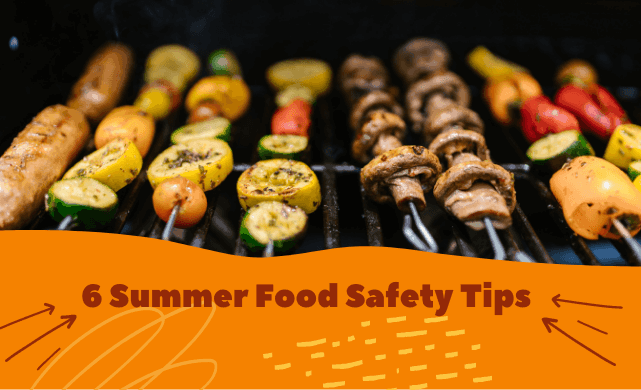With back-to-school season upon us it might seem like summer is over, but we still have more than a month of summer left, along with warm weather and the opportunity to continue enjoying picnics, cookouts, poolside meals and a variety of summer fun activities. The warm weather also creates the perfect environment to support the growth of harmful foodborne germs to thrive. Keep your food and family safe by following these 6 simple food safety tips.
1. Use a thermometer
Food is safely cooked when the internal temperature gets high enough to kill germs that can make you sick. The only way to tell if food is safely cooked is to use a food thermometer. You can’t tell if food is safely cooked by checking its color and texture. Use a food thermometer to ensure foods are cooked to a safe internal temperature.Check this chart for a detailed list of foods and temperatures.
2. Separate raw and cooked foods
Separate foods and don’t cross-contaminate. Raw meat, poultry, seafood, and eggs can spread germs to ready-to-eat foods unless you keep them separate. Use separate cutting boards and plates for raw meat, poultry, and seafood. When grocery shopping, keep raw meat, poultry, seafood, and their juices away from other foods, and when stored in a fridge or a cooler ensure that they are separated.
3. Clean thoroughly
Wash your hands 20 seconds with soap and water before, during, and after preparing food and before eating. Also, clean and disinfect surfaces often. Germs that cause food poisoning can survive in many places and spread around your kitchen. Wash your utensils, cutting boards, and countertops with hot, soapy water.
4. Wash your fruits and vegetables
Rinse fresh fruits and vegetables under running water to eliminate any bacteria. This includes washing produce like watermelon before you slice or peel it to make sure bacteria isn’t transferred from the knife to your fruits or veggies.
5. Don’t re-use marinades
When grilling, throw out marinades and sauces that have touched raw meat juices, which can spread germs to cooked foods. Use clean utensils and a clean plate to remove cooked meat from the grill.
6. Defrost meats properly
Thaw frozen food safely in the refrigerator, in cold water, or in the microwave. Never thaw foods on the counter, because bacteria multiply quickly in the parts of the food that reach room temperature. Bacteria can multiply rapidly if left at room temperature or in the “Danger Zone” between 40°F and 140°F. Never leave perishable food out for more than 2 hours (or 1 hour if it’s hotter than 90°F outside). Know when to throw foods out by following this cold food storage chart.
